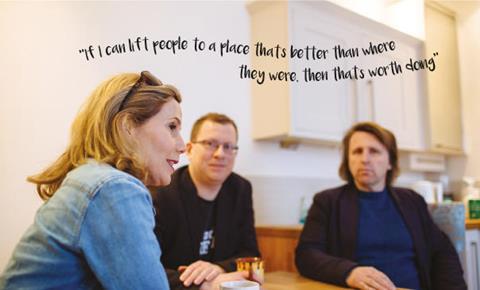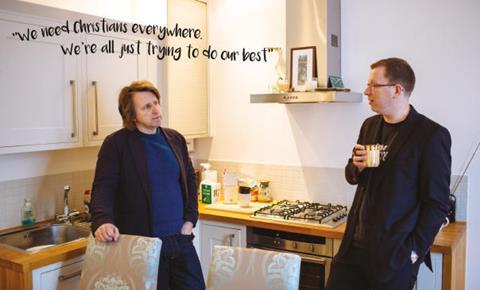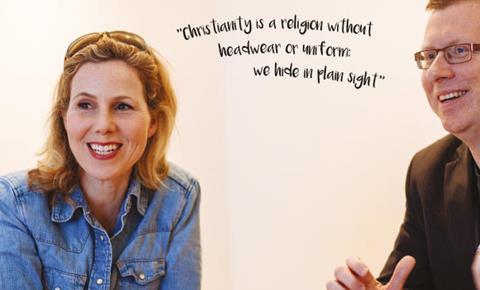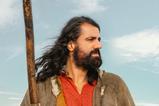Paul Kerensa chats about Christianity and comedy with fellow comedians Sally Phillps and Milton Jones.

Laugh and the world laughs with you; tell the comedy industry that you’re a Christian, and… is that a pin I can hear dropping? Then again, that stereotype of the British comedy scene being ‘atheists at play’ isn’t entirely accurate. They make a loud noise, yes, but for every Stewart Lee there’s a Sally Phillips, for every Ricky Gervais there’s a Tim Vine. That’s not to mention the hundreds of comedians in the middle, on the theological fence or puzzling out what they think about it all, often onstage.
When I first tiptoed onto the comedy stage in 2002 (tiptoeing on was my first blunder), I was dimly aware that some comedians were Christians: acts like Cannon and Ball, Syd Little and Jimmy Cricket. I never thought that this so-called alternative comedy scene might harbour a few kneel-down stand-ups too. Over time I realised that there were more Christians in the comedy industry than I thought, whether stand-ups like Andy Kind and Tony Vino, writers like James Cary and Paul Powell, or front-of-stage performers like Milton Jones or Jo Enright. I realised that I was working not just with hecklefearing folk, but God-fearing folk (or even folk who feared being heckled by God). It was just that the chilly storeroom/green room of Jongleurs Reading wasn’t where you’d find comedians wearing their faith on their sleeves.
It’s true of many industries, I’m sure. Christianity is a religion without headwear, uniform or name-badge; we hide in plain sight. I’d frequently hear bouncers of comedy clubs mutter to me, “You don’t look like a comedian,” and equally plenty of Christians don’t look like Christians either. In any of our workplaces, that person at the next desk might go to church. Or Maria the cleaner. Or Dave the chaplain who pops in occasionally – yes, even him. Sometimes just knowing we have Christians as colleagues can mean we see ourselves not as lone dots, but as solid lines of mutual support.
I worked in the Top Gear office from February to July last year, and discovering that one of the show’s directors was a Christian was a quiet joy. When The Guardian chronicled all of the show’s pitfalls and hiccups in an article entitled ‘God hates Top Gear’, this director and I sat in the middle of the open-plan office loudly analysing the various reasons that God actually loves Top Gear, largely since he’s used it to show us humility and that you get, well, stuck in second gear. It was like a workplace Alpha course, and I’m sure not the first to have an emotionless man in the corner with his arms folded (except this one wore a white racing suit and faceless helmet).
In my twin jobs of comedy writer and stand-up comic, I’ve long been inspired by those with a faith and a visible presence on our TVs. The fame factor is just a by-product; these are simply great comedians doing the best they can, and they’ve done very well and kept God in focus throughout.
So I gathered Sally Phillips and Milton Jones for a cuppa and a chat about comedy, Christianity, and where the two meet. You’re about to read edited highlights of our wide-ranging conversation. Between us we had pretty much every comedy sub-genre covered: writing, acting, stand-up, sitcom, sketch show, panel show, TV, radio, stage and film. Milton’s contributions range from Mock the Week to Live at the Apollo, while Sally is known for Bridget Jones’s Diary, Miranda, Smack the Pony, plus her recent moving documentary, A World Without Down’s Syndrome?. As for me, well, I was just glad for the cup of tea...

Onion layers
Paul: Milton, what came first for you: the comedian or the Christian?
Milton: My family are steeped in church. I wasn’t given the choice about knowing about God and church and things. I had nothing to kick against. What I kicked against was the way church was done.
My actual faith experience has been onion layers rather than one specific story. It becomes a problem when you get into middle age, have been brought up in church a lot and you haven’t rebelled – you get to a moment when you think, “Hmm, it would be quite good to know a before and after, that was more clear.” Because there are times when your faith is tested and you’re not quite sure what you’re standing on - whether it’s just the shoulders of your relatives or your own particular faith.
Paul Kerensa
Paul Kerensa is the co-writer of the popular BBC shows Not Going Out and Miranda. He’s also written for Top Gear and TFI Friday and provided jokes for BBC Radio 4’s The Now Show and The News Quiz. He proudly holds the title of the only belly-button-less comedian in the world - it’s a long story!
That’s an ongoing struggle of mine. So there were lots of Christians around; various key people pointed me in the right direction. But I do think it’s been a case of learning and unlearning. I’m still looking for the truth in many ways. Still haven’t found what I’m looking for. But I feel lighter than I did. Or care less. I’m aware that a certain amount of what I’ve done and said was to impress other people. Or it was what I thought I should say. As opposed to what I thought I should believe.
Paul: Do we think comedy is an area where Christians are needed?
Milton: What industry doesn’t need Christians? There’s something about entertainment that Christians like to say “there’s one of ours!” and drag them in to do an Alpha supper or whatever. I’m moaning already. But there’s a weird thing in the church where it preaches against the culture of celebrity then the first thing we want to do when we do a men’s meeting or whatever is “who do we know whose famous?!” Hang on a minute! I think people actually relate more to people who are like them.
Sally: Ultimately, I think comedy is like everywhere else. It’s frustrating that everyone thinks it’s so different. Should there be Christian accountants? Yes, of course there should be. We need Christians everywhere. We’re all just trying to do our best.
Milton: Also you get that thing where someone says, “You have a marvellous opportunity to preach God’s word in your work and I wish you’d use your powers for good instead of evil.” I always say to that – Christian bakers only make hot cross buns once a year. There’s a time to speak and thing do a God thing. For the most part, you’re just a baker.
Milton Jones
Crazy-haired stand-up comic, Milton Jones is best loved for his deadpan one liners. He writes and stars in his own BBC Radio 4 series Thanks A Lot, Milton Jones! His distinctive colourful shirts accompany his regular appearances on BBC2's Mock The Week.
Sally: But it has been interesting doing this documentary on Down’s syndrome and screening because for the first time I’ve been thinking, “Listen, surely I must be completely aligned with God’s will?” Doing a documentary which asks, “Are we forgetting all lives are equal? We’re not valuing these people, we’re just wiping them out. Let’s look again at these people and where the future might lead us.” I’ve had such an interesting learning curve on that because you know, it’s no more God’s will than anything else. Even though on the surface it might look like it is. Also the temptation to feel self-satisfied and to take control – “I’m very important now because I’m doing this very important thing and I’ve bled all my prayer groups dry for constant support.” On Sunday, we have a very eminent prophet in our church, and he said to me in quite an annoyed voice, “Let it go, Sally, let it go!” and I had to go, “Oh yeah it’s not my thing, it’s not my battle. It’s God’s battle.” He may choose for me to look like a twit and that’s fine. I have to stop meddling and just give it over.
Comedians as prophets?
Paul: You often hear people say “comedy is a dark place, full of atheists” as if it’s a new thing. But comedy has always had these polarising people who want to make a big song and dance against religion and then those who aren’t bothered in the middle.
Sally: I think there’s something about the upside down-ness of comedy that’s very close to God. People talk about the topsy-turvy theology of the kingdom of God where the rich are poor and “the intelligence of the intelligent I will frustrate” [1 Corinthians 1:19]. And the gospel seems like foolishness. There’s a way in which Christian comics could function like Old Testament prophets. I sometimes…why are you looking at me like that?
Milton: Finish what you’re saying, go on…!
Sally: I sometimes get that feeling when I’m watching people do their two-hour show there’s a philosophy of life that’s being presented there. People like Dylan [Moran] and Stewart [Lee]. I haven’t seen you do two hours for ages, Milton. It can’t all be puns!
Milton: Comedy essentially, if it hits, is a lot about the truth in general. That overlaps with faith and what is the truth. There’s a great quote which I haven’t been able to source, but it’s something like: “Before the Life of Brian people looked to bishops for the truth. After that they looked to comedians.” It goes with celebrity culture as well. But you know, with Comic Relief – people look to comedians as not so much role models, but they’re the people who are allowed to preach now.
Sally: I actually go to Private Eye quite often to find out what’s going on in the news. Because the newspapers are just writing for their perceived audience and they don’t have the time, will or finances to do proper investigations. There’s only been a few incidents when I feel like I’ve known more than the papers about what’s going on. In making the documentary about Down’s syndrome screening, I now know more than the journalists about that subject and it’s incredible the way it’s reported – I mean, just the shallowness of the reporting. You’re looking for people who are digging behind the surface and going beyond spin. And that is comedians and things like Private Eye.
Sally Phillips
Sally Phillips is best known for her role as the sweary ‘Shazza’ in the Bridget Jones films. A formidable comic actress and writer, she inspired a generation of comics with her antics on the award-winning sketch show Smack the Pony. She also stars in the SonyAward winning BBC Radio 4 series, Clare in the Community. She recently presented the BBC2 documentary A World Without Down’s Syndrome?
Milton: Going back to Old Testament prophet-y stuff…
Sally: Yeah, I can see you disagree with me there. I’m looking forward to this fight, or skirmish.
Milton: I agree the theory of that is great but don’t you think the people who do preach in comedy are always preaching to the converted? Someone like Mark Thomas or Jeremy Hardy often have an audience that’s on their side to begin with. Any of us could go into church and do a funny sermon. We’d be literally preaching to the converted. But the idea of a Christian going into a club or having a theatre show that would be like an Old Testament prophet…I don’t think Old Testament prophets got big laughs. We’re employed to bring people joy and make people laugh. Do you see what I mean?
Sally: Errr…no. I don’t, actually. I know what you mean but I suppose you don’t have to be going in with a message. Just facts reveal the world to itself. So I think of Dylan Moran saying, “I’d hate to be a woman, I’d never know which of my supposed best friends I despise from one moment to the next.” For me that’s funny, but it’s true. He’s not got a misogynist message. It’s just a reflection. Reflecting back behaviour and many times the Old Testament prophets simply do that, don’t they? They reflect back – “You’re behaving like this. You could be behaving like that.”
Milton: It’s quite God-connected, though, in the Old Testament. They don’t do riffs about family living.
Sally: But it’s not massively specific about God. It’s always the same stuff. Right living.

The list
Paul: We can get distracted quite a lot by which words we should or shouldn’t use to express things. One of my little bugbears is somewhere in BBC Towers there’s this list of ‘you can’t say the F word at that time’.
Sally: Have you not seen the list? The list is hilarious!
Paul: What floor is it on? Can you access it somewhere?
Sally: Yeah, you can access the list quite easily. The funniest one is the Channel 4 list. There’s words on there that you didn’t know existed! I won’t even say them here. They say, “On no account should we say this word.” And you go “That word? What does that word mean?”
Paul: One of my complaints is when I do a lot of script editing things. They say, “We’ve got this new writer, we like this guy’s voice…can you add some jokes to it?” You look through and it’s for, let’s say 8:30 at night, maybe a BBC2 show, so you can’t say the F word. But instead you can say ‘Jesus’ or ‘Christ’ as an expletive. And I think I’d rather hear the F word myself. But culturally we have this situation where we can be using ‘Jesus’ and ‘Christ’. Every time I hear it I wince. I think people aren’t necessarily meaning it with malice. But when you’re working on those shows, you think “this is going out to millions, can we change the dialogue a bit?”
Sally: Yeah, it hurts you, doesn’t it. It hurts your heart. I think that’s a worthwhile thing for us to stop. I haven’t got so much of a problem with the F word but if I can I’ll swap out the Jesuses and Christs.
Paul: It was a sitcom and a child actor saying it. And not just as a Christian but as a comedian I thought, “Well, it’s lazy writing, really.” You look at Blackadder and Fawlty Towers. When they were exasperated there wasn’t a need for ‘the F word’ or ‘the J name’ or anything. It was shown by far funnier means, I think. I think it’s often a shortcut.
Sally: You have to be clear about your motivation for being annoyed, though. They are two different things. One is it’s artistically lazy. In which case let’s have The Thick of It. I personally love the swearing in that, it’s like a high art form. So you do have to be clear what your problem is. And not let them be confused.
Milton: I suppose I don’t understand; if people don’t believe in God, why write it? Culturally I don’t know why people feel the need to say it, if they don’t have any faith.
Changing the type of laughter
Paul: So, subject matter: do you feel that sense of putting stuff out there into culture and conversations – the weight of it?
Milton: I don’t think about it that much. You just do it, especially if you don’t have a specific message. Broadly speaking if it works, it’s about bringing joy.
I’ve seen Tim Vine go into clubs, (and it’s rare we’re on the same bill) but he just changes atmospheres. It’s just the jokes and the way he’s doing things. It changes the type of laughter actually in terms of sweary old acts in front of stag nights doing a certain type of joke. There’s an aggression to the laughter. Then Tim comes on and there’s 30 seconds while everyone is thinking. “What’s going on’? These are just jokes?” And he’s putting cartoons in people’s heads. You know the way he relentlessly hammers it, hammers it, hammers it.
If you just listen to the laughter, you know this is different laughter. This is more than just people laughing at people being rude to other people. To my mind this is a higher level. And if I can achieve that in some way… it doesn’t have to have a message. It doesn’t have to be a Tim Vine-type joke. But if I can lift people to a place that’s better than where they were, then that’s still worth doing.
Sally: I had a similar experience going to see Miranda Hart’s show. I saw three generations of family – grandparents, parents and kids – all there together and I heard her from the stage going “you are fearfully and wonderfully made!”. Telling you that you are acceptable. Doesn’t matter if you fart or fall over in the middle of the street. Doesn’t matter if you go in a shop and don’t buy anything. You don’t have to pretend you’re going to buy anything, just exit. Take down your masks. The freedom people were feeling from having someone say that was so immense.

The preacher’s set
Paul: Do you think there are things preachers could learn from comedians?
Sally: I tell you what I find quite often with preaching. There’s a lack of awareness about the big picture impression of what they’re saying. So your classic sermon is how it’s all about grace. But the way they will impress upon you it’s all about grace is by listing how horrific you are in ways you haven’t previously thought.
So you’ve got 20 minutes, and 18 minutes of that will be explaining to you that you’re vile and why you really need God’s salvation, and two minutes will be ‘hooray there’s God’s salvation!’ I find it over and over again. The big picture image within the Church is specifically the opposite of what the message is. I find that in comedy often the big picture is more aligned with God’s purposes. Even if the specific lines, the small picture, isn’t.
Milton: It always amazes me that preachers have to come up with 20 minutes or longer in a week. You think, well, inevitably the quality of that (never mind what God does with it) is going to be first or second draft at best. I think it was Frank Skinner who came up with the idea of why don’t all preachers have three 20-minute sets, then swap around? That would make a lot more sense. Given that people’s message is mostly them, anyway – 98 per cent of your communication is who you are, rather than what you’re saying. Not sure that could be mathematically true. But most comedians, even though they do two hours, they only really have 20 minutes. Quite often it’s the same 20 minutes in slightly different packaging. Maybe the same is true of church leaders? They have an emphasis on some particular thing that’s part of who they are. They need to be more relaxed with just doing the same thing again, or communicating it better.
Paul: I know I’ve heard a few preachers and I think, “I like their stuff. I’m going to get on the podcast and download it for my car journeys” and you realise it’s the same stuff. It’s a different Bible reading but the same stuff. I found myself thinking it’s like Eddie Izzard’s ‘Dress to Kill’ tour that I went to see after getting the VHS and it was exactly the same. Then I started doing stand-up and realised you can’t have that sort of turnover. It’s a similar thing, I suppose.





































